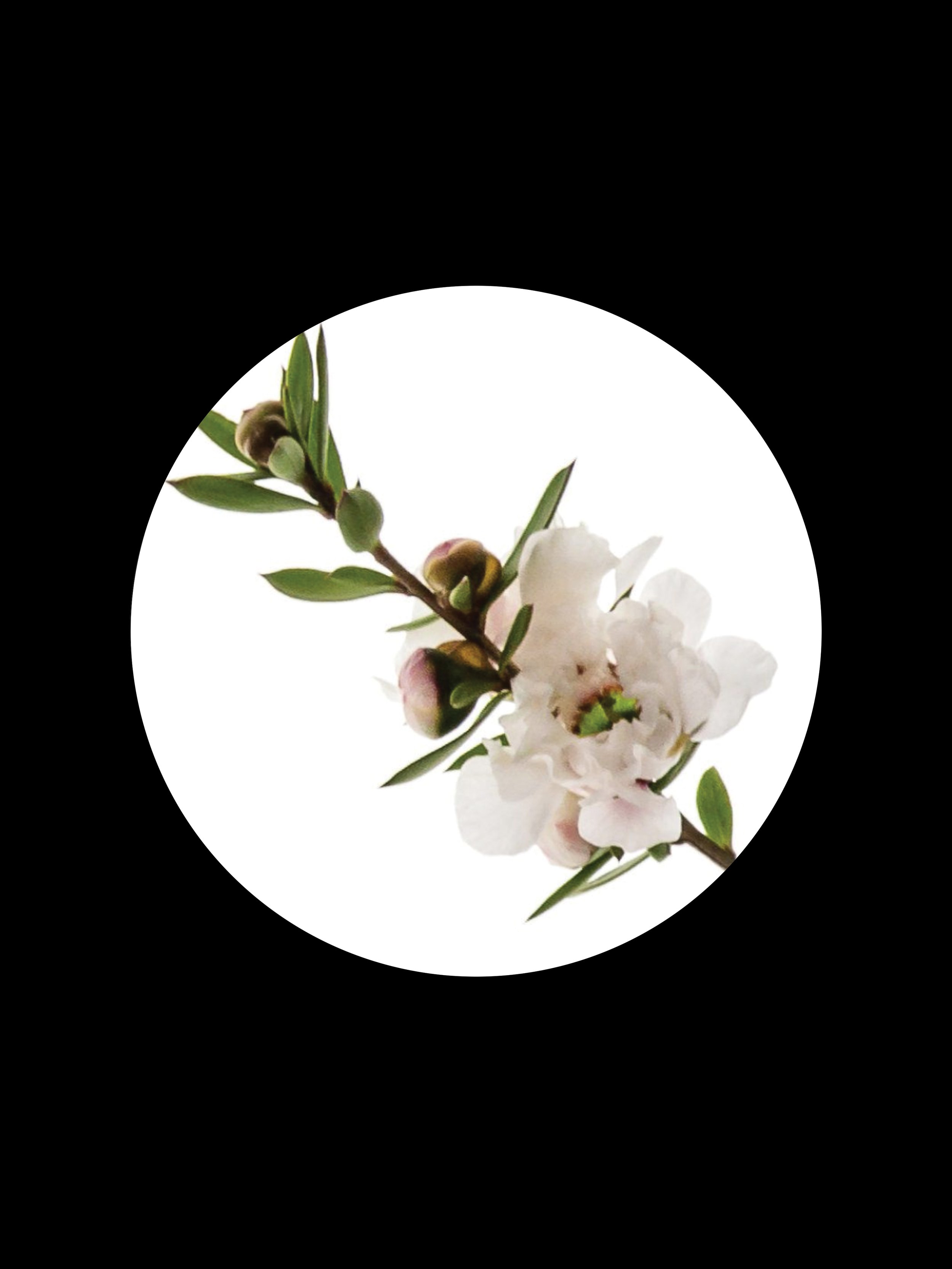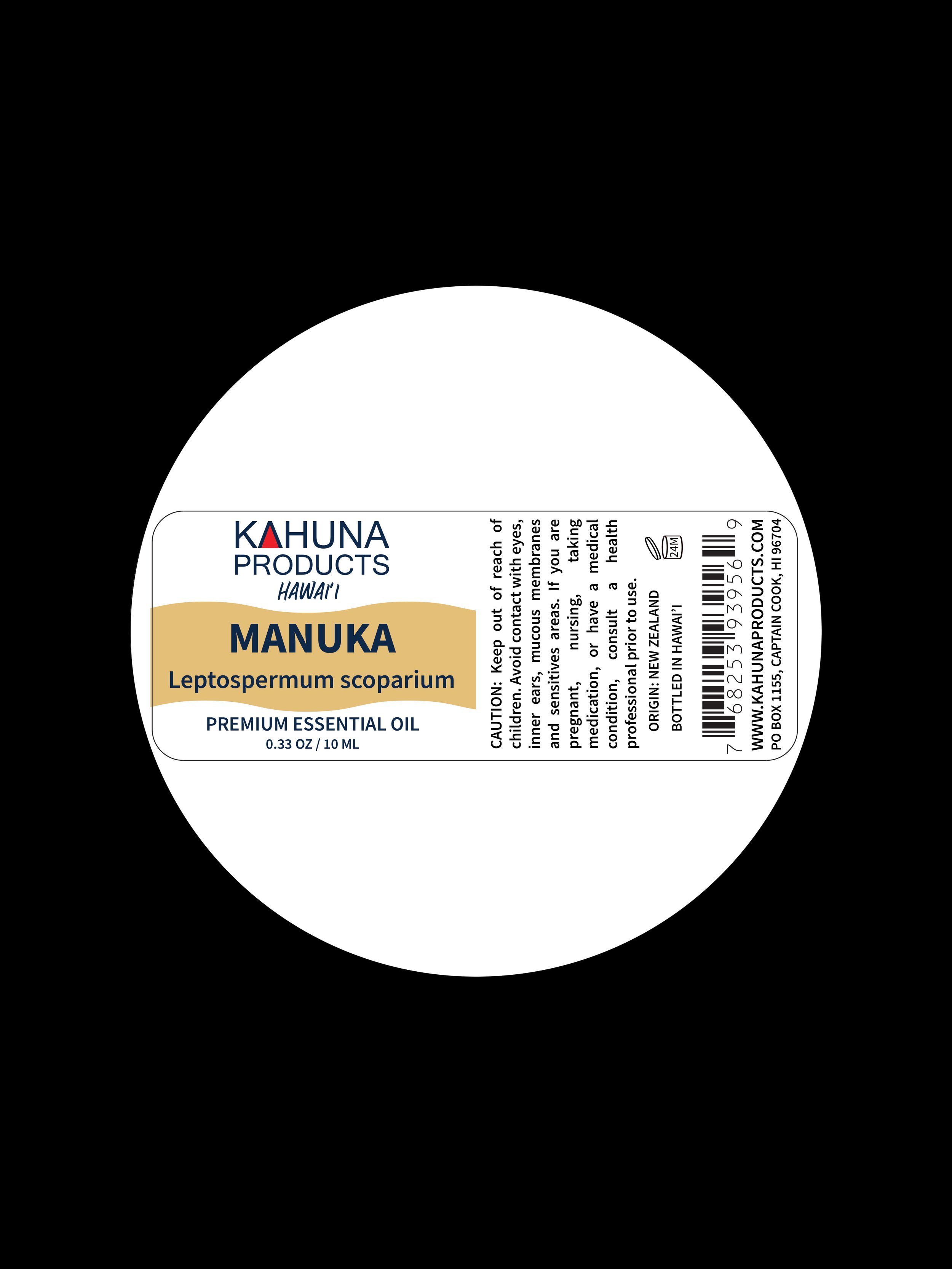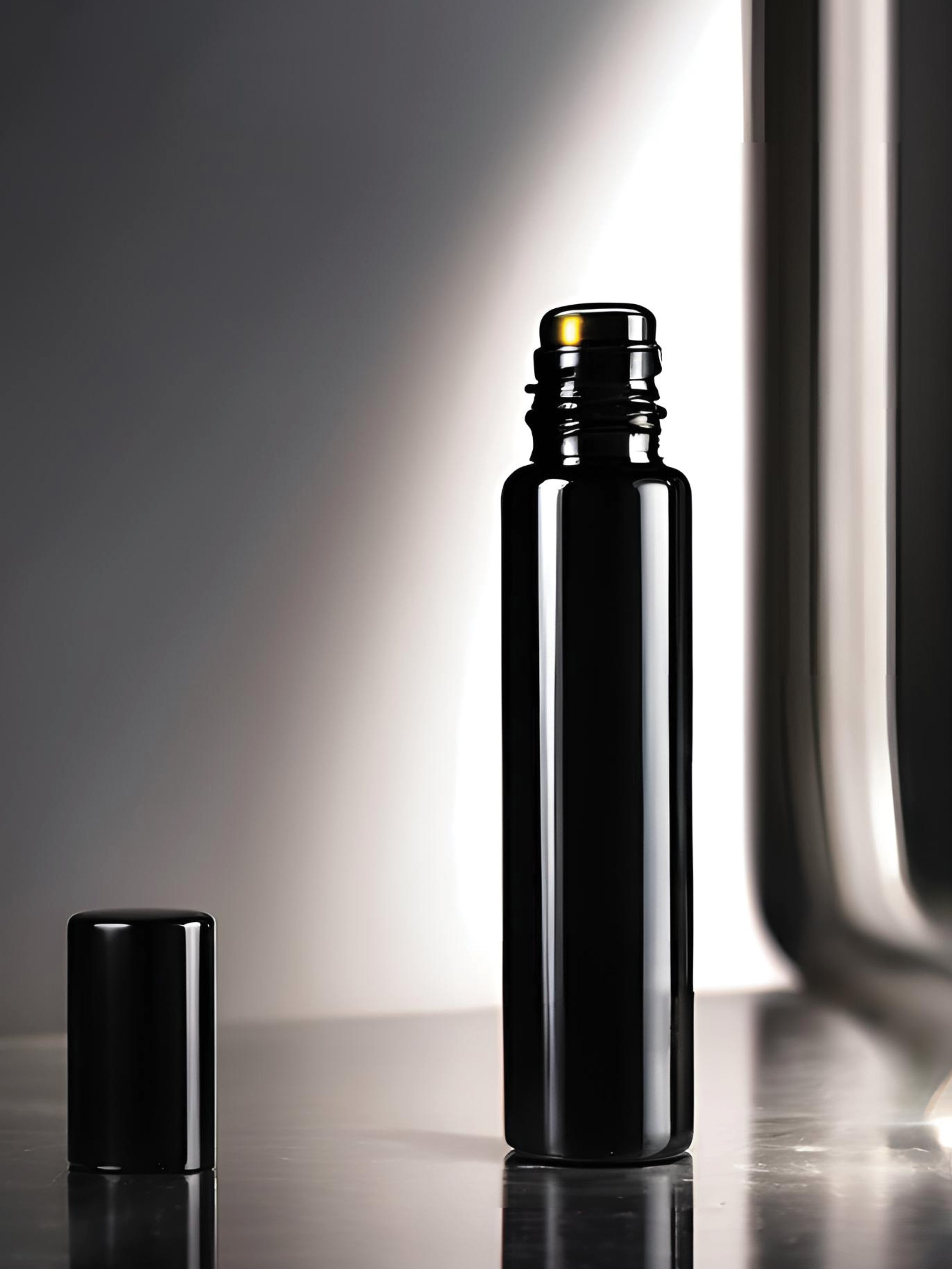 Image 1 of 2
Image 1 of 2

 Image 2 of 2
Image 2 of 2



MANUKA ESSENTIAL OIL
Leptospermum scoparium, commonly known as manuka, is a shrub native to New Zealand and southeastern Australia. The essential oil derived from its leaves and branches is known for its various health benefits and uses in aromatherapy. Here are some key benefits and uses:
Benefits of Leptospermum scoparium (Manuka) Essential Oil
Antimicrobial Properties:
Manuka essential oil is renowned for its potent antimicrobial properties, making it effective against a variety of bacteria, fungi, and viruses. It's often used to treat skin infections and wounds.
Anti-inflammatory Effects:
The oil has anti-inflammatory properties that can help reduce inflammation and swelling. It is beneficial for conditions such as arthritis and joint pain.
Skin Health:
Manuka oil is used to treat various skin conditions like acne, eczema, and psoriasis. It promotes the healing of cuts, burns, and insect bites due to its antibacterial and anti-inflammatory properties.
Respiratory Health:
The oil can help alleviate respiratory issues such as coughs, colds, and bronchitis. Its antimicrobial properties help in clearing infections, while its anti-inflammatory effects can reduce respiratory tract inflammation.
Oral Health:
Due to its antimicrobial action, manuka essential oil is beneficial for oral health, helping to combat oral bacteria that cause bad breath, gum disease, and tooth decay.
Immune System Support:
Regular use of manuka oil can boost the immune system, helping the body to resist infections more effectively.
Pain Relief:
It can be used to relieve pain from muscle aches, joint pain, and other inflammatory conditions.
Aromatherapy Uses
Stress and Anxiety Relief:
The calming aroma of manuka oil can help reduce stress and anxiety. It promotes relaxation and can improve sleep quality.
Mood Enhancement:
The oil's scent has uplifting properties that can help improve mood and combat feelings of depression and fatigue.
Air Purification:
Diffusing manuka oil can purify the air, eliminating airborne bacteria and creating a healthier indoor environment.
Respiratory Support:
Inhaling the vapors of manuka oil, either through steam inhalation or a diffuser, can help clear the sinuses and respiratory passages, providing relief from congestion and respiratory discomfort.
How to Use Manuka Essential Oil in Aromatherapy
Diffusion:
Add a few drops of manuka essential oil to a diffuser to cleanse the air, reduce stress, and support respiratory health.
Topical Application:
Dilute manuka oil with a carrier oil (like coconut or jojoba oil) before applying it to the skin. This can help treat skin conditions, reduce inflammation, and relieve pain.
Inhalation:
Add a few drops of manuka oil to hot water and inhale the steam. This method is especially useful for respiratory issues and sinus congestion.
Bath:
Add a few drops of manuka oil to a warm bath to relax muscles, reduce stress, and improve skin health.
Massage:
Use diluted manuka oil in massage to relieve muscle and joint pain, reduce stress, and improve overall well-being.
Gargle:
For oral health, add a drop of manuka oil to a glass of warm water and use it as a mouthwash to kill oral bacteria and freshen breath.
Precautions
Dilution: Always dilute manuka essential oil with a carrier oil before applying it to the skin to avoid irritation.
Patch Test: Perform a patch test to check for any allergic reactions.
Pregnancy and Breastfeeding: Consult a healthcare provider before using manuka oil during pregnancy or while breastfeeding.
Children: Use with caution on children and consult with a healthcare provider before use.
Manuka essential oil is a versatile and powerful oil with a wide range of benefits for physical health and emotional well-being. Its uses in aromatherapy make it a valuable addition to any essential oil collection.
Leptospermum scoparium, commonly known as manuka, is a shrub native to New Zealand and southeastern Australia. The essential oil derived from its leaves and branches is known for its various health benefits and uses in aromatherapy. Here are some key benefits and uses:
Benefits of Leptospermum scoparium (Manuka) Essential Oil
Antimicrobial Properties:
Manuka essential oil is renowned for its potent antimicrobial properties, making it effective against a variety of bacteria, fungi, and viruses. It's often used to treat skin infections and wounds.
Anti-inflammatory Effects:
The oil has anti-inflammatory properties that can help reduce inflammation and swelling. It is beneficial for conditions such as arthritis and joint pain.
Skin Health:
Manuka oil is used to treat various skin conditions like acne, eczema, and psoriasis. It promotes the healing of cuts, burns, and insect bites due to its antibacterial and anti-inflammatory properties.
Respiratory Health:
The oil can help alleviate respiratory issues such as coughs, colds, and bronchitis. Its antimicrobial properties help in clearing infections, while its anti-inflammatory effects can reduce respiratory tract inflammation.
Oral Health:
Due to its antimicrobial action, manuka essential oil is beneficial for oral health, helping to combat oral bacteria that cause bad breath, gum disease, and tooth decay.
Immune System Support:
Regular use of manuka oil can boost the immune system, helping the body to resist infections more effectively.
Pain Relief:
It can be used to relieve pain from muscle aches, joint pain, and other inflammatory conditions.
Aromatherapy Uses
Stress and Anxiety Relief:
The calming aroma of manuka oil can help reduce stress and anxiety. It promotes relaxation and can improve sleep quality.
Mood Enhancement:
The oil's scent has uplifting properties that can help improve mood and combat feelings of depression and fatigue.
Air Purification:
Diffusing manuka oil can purify the air, eliminating airborne bacteria and creating a healthier indoor environment.
Respiratory Support:
Inhaling the vapors of manuka oil, either through steam inhalation or a diffuser, can help clear the sinuses and respiratory passages, providing relief from congestion and respiratory discomfort.
How to Use Manuka Essential Oil in Aromatherapy
Diffusion:
Add a few drops of manuka essential oil to a diffuser to cleanse the air, reduce stress, and support respiratory health.
Topical Application:
Dilute manuka oil with a carrier oil (like coconut or jojoba oil) before applying it to the skin. This can help treat skin conditions, reduce inflammation, and relieve pain.
Inhalation:
Add a few drops of manuka oil to hot water and inhale the steam. This method is especially useful for respiratory issues and sinus congestion.
Bath:
Add a few drops of manuka oil to a warm bath to relax muscles, reduce stress, and improve skin health.
Massage:
Use diluted manuka oil in massage to relieve muscle and joint pain, reduce stress, and improve overall well-being.
Gargle:
For oral health, add a drop of manuka oil to a glass of warm water and use it as a mouthwash to kill oral bacteria and freshen breath.
Precautions
Dilution: Always dilute manuka essential oil with a carrier oil before applying it to the skin to avoid irritation.
Patch Test: Perform a patch test to check for any allergic reactions.
Pregnancy and Breastfeeding: Consult a healthcare provider before using manuka oil during pregnancy or while breastfeeding.
Children: Use with caution on children and consult with a healthcare provider before use.
Manuka essential oil is a versatile and powerful oil with a wide range of benefits for physical health and emotional well-being. Its uses in aromatherapy make it a valuable addition to any essential oil collection.
Leptospermum scoparium, commonly known as manuka, is a shrub native to New Zealand and southeastern Australia. The essential oil derived from its leaves and branches is known for its various health benefits and uses in aromatherapy. Here are some key benefits and uses:
Benefits of Leptospermum scoparium (Manuka) Essential Oil
Antimicrobial Properties:
Manuka essential oil is renowned for its potent antimicrobial properties, making it effective against a variety of bacteria, fungi, and viruses. It's often used to treat skin infections and wounds.
Anti-inflammatory Effects:
The oil has anti-inflammatory properties that can help reduce inflammation and swelling. It is beneficial for conditions such as arthritis and joint pain.
Skin Health:
Manuka oil is used to treat various skin conditions like acne, eczema, and psoriasis. It promotes the healing of cuts, burns, and insect bites due to its antibacterial and anti-inflammatory properties.
Respiratory Health:
The oil can help alleviate respiratory issues such as coughs, colds, and bronchitis. Its antimicrobial properties help in clearing infections, while its anti-inflammatory effects can reduce respiratory tract inflammation.
Oral Health:
Due to its antimicrobial action, manuka essential oil is beneficial for oral health, helping to combat oral bacteria that cause bad breath, gum disease, and tooth decay.
Immune System Support:
Regular use of manuka oil can boost the immune system, helping the body to resist infections more effectively.
Pain Relief:
It can be used to relieve pain from muscle aches, joint pain, and other inflammatory conditions.
Aromatherapy Uses
Stress and Anxiety Relief:
The calming aroma of manuka oil can help reduce stress and anxiety. It promotes relaxation and can improve sleep quality.
Mood Enhancement:
The oil's scent has uplifting properties that can help improve mood and combat feelings of depression and fatigue.
Air Purification:
Diffusing manuka oil can purify the air, eliminating airborne bacteria and creating a healthier indoor environment.
Respiratory Support:
Inhaling the vapors of manuka oil, either through steam inhalation or a diffuser, can help clear the sinuses and respiratory passages, providing relief from congestion and respiratory discomfort.
How to Use Manuka Essential Oil in Aromatherapy
Diffusion:
Add a few drops of manuka essential oil to a diffuser to cleanse the air, reduce stress, and support respiratory health.
Topical Application:
Dilute manuka oil with a carrier oil (like coconut or jojoba oil) before applying it to the skin. This can help treat skin conditions, reduce inflammation, and relieve pain.
Inhalation:
Add a few drops of manuka oil to hot water and inhale the steam. This method is especially useful for respiratory issues and sinus congestion.
Bath:
Add a few drops of manuka oil to a warm bath to relax muscles, reduce stress, and improve skin health.
Massage:
Use diluted manuka oil in massage to relieve muscle and joint pain, reduce stress, and improve overall well-being.
Gargle:
For oral health, add a drop of manuka oil to a glass of warm water and use it as a mouthwash to kill oral bacteria and freshen breath.
Precautions
Dilution: Always dilute manuka essential oil with a carrier oil before applying it to the skin to avoid irritation.
Patch Test: Perform a patch test to check for any allergic reactions.
Pregnancy and Breastfeeding: Consult a healthcare provider before using manuka oil during pregnancy or while breastfeeding.
Children: Use with caution on children and consult with a healthcare provider before use.
Manuka essential oil is a versatile and powerful oil with a wide range of benefits for physical health and emotional well-being. Its uses in aromatherapy make it a valuable addition to any essential oil collection.
-
INCI NAME: Leptospermum Scoparium Branch/Leaf Oil.
ORIGIN: New Zealand (East Cape). Bottled in Hawai’i.
PART USED: Leaves and Twigs.
EXTRACTION METHOD: Steam Distilled Essential Oil.
NOTE CLASSIFICATION: Top to Middle Note.
-
Leptospermum scoparium (manuka) essential oil blends well with various other essential oils, enhancing both its therapeutic properties and aromatic profile. Here are some essential oils that pair well with manuka oil:
Essential Oils That Blend Well with Manuka Oil
Lavender:
Lavender oil is calming and soothing, making it a perfect companion for manuka oil in blends aimed at relaxation, stress relief, and skin care.
Tea Tree:
Tea tree oil complements manuka oil's antimicrobial properties, creating a powerful blend for treating skin infections, acne, and wounds.
Eucalyptus:
Eucalyptus oil enhances manuka oil’s respiratory benefits, making this combination effective for relieving congestion, colds, and respiratory issues.
Lemon:
Lemon oil adds a fresh, uplifting scent to manuka oil, making it a great combination for mood enhancement, air purification, and boosting the immune system.
Frankincense:
Frankincense oil pairs well with manuka for its grounding and anti-inflammatory properties, making it beneficial for meditation, skin care, and reducing stress.
Rosemary:
Rosemary oil enhances manuka’s antimicrobial and respiratory benefits, making it useful for improving focus, reducing mental fatigue, and supporting respiratory health.
Bergamot:
Bergamot oil adds a citrusy, uplifting note to manuka oil, making this blend ideal for stress relief, mood enhancement, and creating a calming environment.
Clary Sage:
Clary sage oil’s calming and balancing properties complement manuka oil, making this blend beneficial for hormonal balance, reducing stress, and promoting relaxation.
Geranium:
Geranium oil pairs well with manuka for skin care, emotional balance, and creating a floral, calming aroma.
Cedarwood:
Cedarwood oil enhances the grounding and calming properties of manuka oil, making it suitable for promoting relaxation, reducing anxiety, and improving sleep.
Blending Tips
Proportions: Start with a small amount of manuka oil and add complementary oils drop by drop to achieve the desired scent and therapeutic effect.
Carrier Oils: Always dilute essential oil blends with a carrier oil like coconut, jojoba, or almond oil before applying them to the skin.
Test: Perform a patch test to ensure there are no allergic reactions to the blend.
Storage: Store blends in dark glass bottles to protect them from light and heat, which can degrade the oils.
Sample Blends
Relaxing Blend:
2 drops Manuka
3 drops Lavender
2 drops Frankincense
Skin Healing Blend:
2 drops Manuka
2 drops Tea Tree
2 drops Geranium
Respiratory Support Blend:
2 drops Manuka
3 drops Eucalyptus
2 drops Rosemary
Uplifting Blend:
2 drops Manuka
3 drops Lemon
2 drops Bergamot
Grounding Blend:
2 drops Manuka
3 drops Cedarwood
2 drops Clary Sage
These blends can be used in diffusers, added to bathwater, or diluted with a carrier oil for topical application. Adjust the proportions to suit your preferences and needs.
-
They can be inhaled directly from the bottle, diffuser, or humidifier.
They should be diluted with a carrier oil when applied to your skin. We suggest a 4% dilution rate.
You can also add them to your favorite skincare products.
Essential oils are not safe for consumption unless you are under a health practitioner's guidance.
-
100% Pure Essential Oil.
Unrefined, Undiluted, No Fillers, No Synthetics, Organic, and Sustainably sourced.
-
0.33 oz / 10 ml
Amber glass bottle with euro dropper.
-
Keep out of reach of children. The bottles are a choking hazard. Avoid contact with eyes, inner ears, mucous membranes, and sensitive areas. If you are pregnant, nursing, taking medication, or have a medical condition, consult a health professional prior to use.
Animals are more sensitive to certain scents; consider your pets while choosing essential oils.
While not all essential oils have the same effect on everyone, the key is finding which ones work best for you. You are the individual and know what is best for you. So experiment and find your path.
The products described on this website are not intended to diagnose, treat or prevent any disease or to affect any structure or function of the skin or body. The information on this website is not medical advice and is not a substitute for consulting with a healthcare provider.





